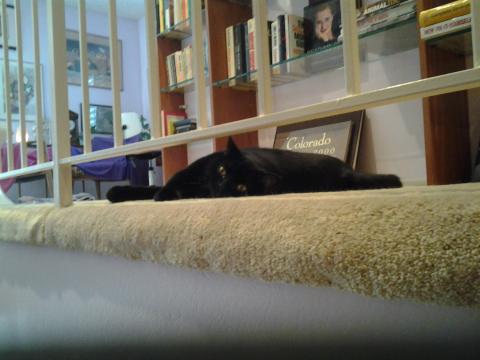They finally figured out why I have had diarrhea all the time. The stool samples at the vet clinic were always clear but I still had diarrhea. They gave me Metronidazole (oral med) a few times. The diarrhea would stop while I was on the Metronidazole but as soon as the medicine stopped, the diarrhea came back. So, they sent my stool out to a special lab. The lab did a number of tests. One was a DNA test for the presence of a number of parasites. They found that I had the parasite, Tritrichomonas Foetus (TF). Although my sisters and brothers had no symptoms, they also had the parasite because we all use the same litter boxes.
Per my veterinarians, there is no approved treatment for felines in the United States for this parasite. However, Ronidazole (oral, capsule med) is the recommended treatment. The prescription doses were calculated based on our weight. They were prepared at a compounding pharmacy. There are possible neurological side-effects so Meowmuh had to watch each of us very closely. But we were fine. It was a lot of work and worry for her. Besides medicating us daily, she had to disinfect our litter boxes, bowls, and where we slept and played..
She tests us every few months. When she collects our samples she puts us in separate rooms with new litter boxes and fresh litter. Then she waits patiently until we 'produce.' She says the tests are expensive but we have all been clear of the parasite for over one year and, miracle of miracles, my diarrhea stopped the first day of the treatment. I guess you could say I am a diarrhea-and-parasite-free guy.
Meowmuh says there are many internet searches that provide extensive information and experiences regarding the parasite and the treatment. Some cats, like me, have diarrhea and other cats have no symptoms but are carriers. The parasite lives in the colon and sheds in our feces...in the litter box. That is why other cats can so easily get ithe parasite when they lick their paws to groom. Some cats become picky eaters and lose weight. Me? I was never a picky eater, I can assure you of that. Meowmuh says she learned more about the parasite by doing internet searches like petMD, ncbi.nim.nih.gov (discusses dose effectiveness) and showcatsonline.com. The latter site gives a thorough description of their experience trying to diagnose the problem, identify it and treat it. There are many more helpful internet results.
Meowmuh says: "Get the best tests and advice that you can find." She must think that we are worth the time, expense and worry. When it comes to us, we know that she will never give up.



Comments
Really interesting... and
I hope that by telling my